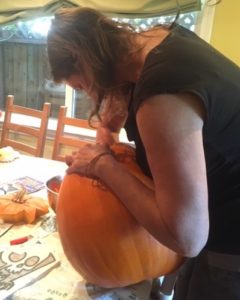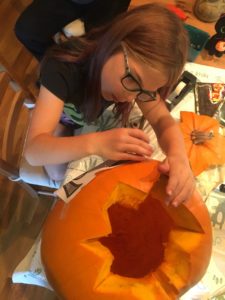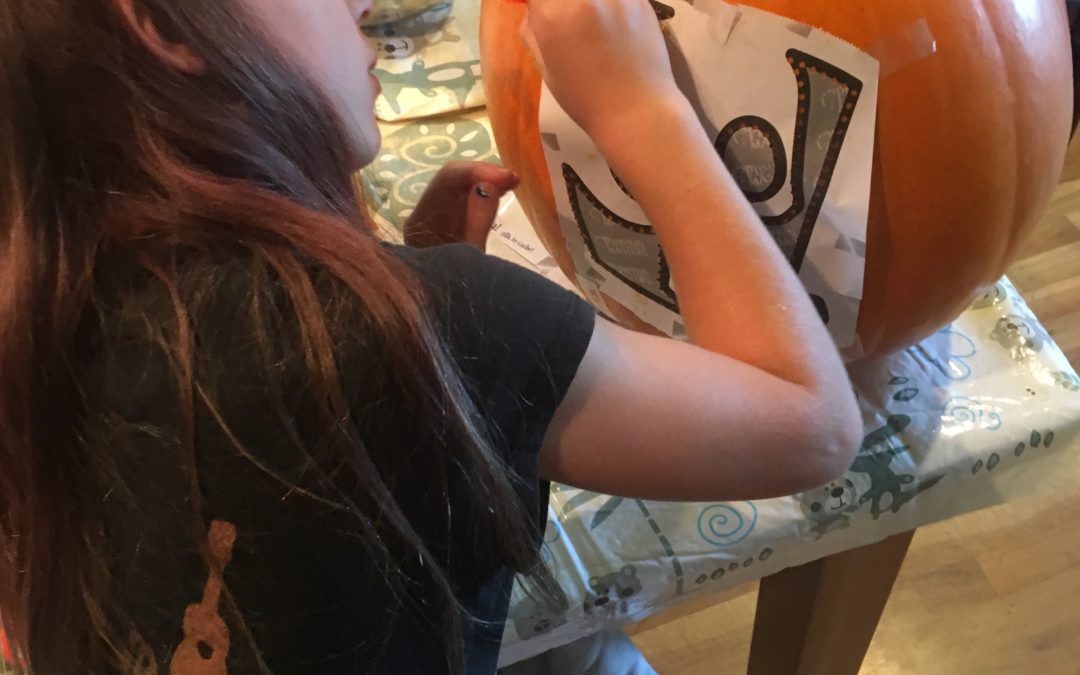 It Takes An Aunty
It Takes An Aunty
My granddaughter’s Aunt K.K. came over to help with pumpkin carving this week. She hefted the extra-large pumpkin Bean had selected at the pumpkin patch on to our dining room/craft table and turned it around several times, looking for the best side. “I think it’s this one,” she announced with a flourish.
Meanwhile, Bean went through our Halloween box to find the carving tools and pattern book. She leafed through the patterns, entering into deep discussion with her aunt about the appropriateness of each design. They settled on a scary/cute skeleton head. Auntie K.K. cut out the top of the behemoth and began scooping out the flesh. The project was on its way.
While they scooped and poked and cut, I thought about the precious gifts that aunties give to the children they love.
My English Aunties
My parents and I immigrated to the States when I was two years old. Other than two great aunts and great uncles, one on each side of the country, we had no relatives here. But my parents discovered an English community in the San Francisco Bay area, joined the Sons of St George Lodge and the Golden Gate Cricket Club, and suddenly I had a plethora of aunts (and uncles too, but this story is about aunties).
Aunt Rhoda, who had no children of her own, crocheted marvelous dresses for my storybook dolls, and taught me how to make potholders. Aunt Edith, also childless, invited me for weekend stays and introduced me to the delights of washing my hair in a shower instead of a bath, and of baking, and embroidery. Aunt Lenora dyed Easter Eggs with me and her two sons, and then, while the eggs were drying, told the boys to play outside and proceeded to give me my first permanent wave.
These aunties gave me far more than time, or even memorable experiences. They gave me themselves. In ways no busy parent can manage for long, they listened to me chatter on about this and that, free of judgment and always – seemingly – interested. As we spent time together over the years, I confided my fears and concerns to each of them, and was never scolded or instructed to be a “big girl.” Sometimes they told me funny stories about my parents. Always, they seemed relaxed, as if they had all the time in the world. They told me the truth about things. I trusted them.
Aunties in India
In the early 2000s, I was privileged to stay several times in an ashram in northern India. Inside the ashram walls were an orphanage and a school. Whenever I played with the children or helped them with their lessons, they called me Aunty. I soon learned that it was impolite for children to call adults by their given names, and so, perhaps due to the British influence, they called all adult women Aunty who did not have a specific relationship role in their life, such as mother or grandmother.
Being called Aunty made me feel a part of the community. It also reminded me of my own aunties, and encouraged me to build relationships with the children as they had with me. Respect for elders is very much a part of Indian culture. In return for the respect children show these adults in their lives, accepting the role of aunty includes being a part of the “village” that cares for the children. That village might be rural, like ours was, or it may be an urban setting where parents have moved for work as modern couples often do. There, the aunties serving in that guidance and protection role may be adult friends the parents have made in their new home or at work.
Which brings us back to Aunty K.K.
Relationships take time
K.K. has earned her chops as an Aunty. My daughter’s closest friend, she walked with Doña during her many hours of labor, and attended Bean’s birth. She has been there for every important occasion – birthdays, holidays, school performances, sporting events. When Bean was learning to ride a two-wheeler, she had a second bike added to her own so they could ride their bicycle-built-for two together. When Bean graduated to riding on the road on her own wheels, K.K. went with her – sometimes on foot, running alongside. When Bean indicated an interest in rock climbing, K.K. bought her a membership in a climbing gym. They’ve been building their relationship for eight and three quarter years (Bean’s words) – and they worked together seamlessly on that darned pumpkin.
Bean has three perfectly good aunties by blood or marriage, but each of them comes with a delghtful cousin, who I fear takes Bean’s awareness away from the grown-up people. Aunty K.K. is her own special aunty, who – although she may have other honorary nieces and nephews or perhaps even some who are related – makes sure that whenever they are together, Bean is at the center of her attention.
Thank you, Aunty K.K.! And thank you, Aunties everywhere.
Did you enjoy this story? Do you have any stories of your own about aunties? To share your thoughts, please scroll down to the link at the bottom and leave a comment.
To receive my posts in your email whenever they are published, type your email address into the subscription box on my web page. I promise, I’ll never send spam . . .
Marlene
Share this post





Thank you for this beautiful, thoughtful blog! It’s great to see stellar Auntie KK (a dear friend of mine) celebrated. And as an auntie who also has many wonderful aunties, I relate to your stories and love your insights. This line especially captures my experience with awesome aunts: “In ways no busy parent can manage for long, they listened to me chatter on about this and that, free of judgment and always – seemingly – interested.”
Natascha,
I’m so pleased that my words resonated with you. Auntie KK is a valued member of our family, but I suspect it will be many years before the object of her affection will realize just how important that grownup has been in shaping her mind and body. You and I are fortunate to have also experienced loving aunts, and we now understand the dynamic.